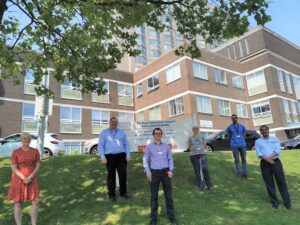A new lightweight wearable device delivering tiny electrical pulses to the arm to help stroke survivors overcome abnormal stiffness in the arm, a major barrier to their recovery, is to be developed by researchers from Sheffield Teaching Hospitals NHS Foundation Trust in a groundbreaking trial.
The new Sheffield Adaptive Patterned Electrical Stimulation (SHAPES) device, which works like a TENS machine but is far more advanced, is to be built and tested thanks to £1.2m grant award from the National Institute for Health Research’s ‘Invention for Innovation’ programme.
The new device builds on the expertise in electrical stimulation research of the clinical engineering team at Sheffield Teaching Hospitals NHS Foundation Trust.
Through a unique combination of electronic design and programming, the SHAPES technology is able to deliver continuous moving patterns of tiny electrical pulses to the arm to multiple areas at any given time. The intensity, timings and combinations of pulse delivery can also be programmed to be automatically adjusted. Previous research suggests that this variability in sensations is important in improving recovery from the muscle stiffness caused by stroke.
The SHAPES technology will be tested on patients, recruited between two to sixteen weeks post-stroke, in a clinical trial later in the year. It is hoped that the technology will improve rehabilitative outcomes for stroke patients at an optimal point in their recovery and will be cost-effective for the NHS to use.
Sheffield Teaching Hospitals NHS Foundation Trust is to work in partnership with the NIHR Devices for Dignity MedTech Co-operative, University of Sheffield’s School of Health and Related Research, Coventry University, Barnsley Hospital NHS Foundation Trust, and Medipex Limited during the three-year study.
Professor Wendy Tindale, Scientific and Innovation Director at Sheffield Teaching Hospitals NHS Foundation Trust and Chief Investigator, said: “We are delighted to have received funding from the National Institute for Health Research to help develop and test this really innovative technology, which is responding to what people living with stroke have told us has the potential to make a really significant impact on their quality of life. The project is a fantastic example of the benefits of co-producing research, and we are very excited to be working together with an expert, multi-disciplinary team to focus on the technical, clinical and economic aspects of the new technology, with patient needs at the heart of our challenge.”
Dr Siva Nair: Consultant Neurologist at Sheffield Teaching Hospitals NHS Foundation Trust and lead for the clinical trial, said: “Our device is a significant technological advancement in the field of therapeutic electrical stimulators. Muscle stiffness in the arm is a major barrier to rehabilitation after stroke, so we are really pleased that we have received funding to test this innovative form of treatment. If our study is successful it will lead to a novel therapy for the rehabilitation of muscle stiffness after stroke. The technology also has the potential to be useful in the treatment of muscle stiffness in several other diseases of the brain and spinal cord, such as head injury and multiple sclerosis which could offer renewed hope to thousands of patients living with the consequences of debilitating neurological conditions.”
Professor Adewale O Adebajo, said the new technology was important in addressing an unmet need in stroke survivors: “Excessive muscle stiffness in an arm is a really unpleasant and painful consequence of having a stroke. I was mainly wheelchair dependent following my stroke and I suffered a lot of weakness in my left side, but one of the things I wanted to do during my recovery was to use my left arm. I love playing table tennis, but I couldn’t do that, and when I would lift my arm up and let it go it was just like dead wood. It was very unpleasant. In my opinion Sheffield is a world leader in stroke research, so this new technology, if successful, could really help in reducing pain and symptoms and in restoring arm function.”
The technical development of the device and its testing, including meeting all safety and regulatory approvals, is being led by Dr Jamie Healey, Lead Clinical Scientist, and other members of the clinical engineering team at Sheffield Teaching Hospitals NHS Foundation Trust.
The project is scheduled to last 39 months, with trial results expected in spring 2024.
More information here
You are here: Home1 / News2 / Latest News3 / New project to develop an innovative therapy device to help stroke survivors...
Contact Us
NIHR Devices for Dignity MedTech Co-operative
Sheffield Teaching Hospitals NHS
Foundation Trust
D33, Royal Hallamshire Hospital
Glossop Road
Sheffield
S10 2JF
0114 271 2159
Latest News
Latest Events
 Validating the Need for your Product: Involving Future Users (Clinicians, Patients, Families) Webinar13th April 2022 - 4:06 pm
Validating the Need for your Product: Involving Future Users (Clinicians, Patients, Families) Webinar13th April 2022 - 4:06 pm NIHR i4i Challenge Award in Real World Implementation – open for applications 4th November28th October 2021 - 11:32 am
NIHR i4i Challenge Award in Real World Implementation – open for applications 4th November28th October 2021 - 11:32 am NIHR SME Consultation Event – Friday 5th November20th October 2021 - 9:57 am
NIHR SME Consultation Event – Friday 5th November20th October 2021 - 9:57 am




